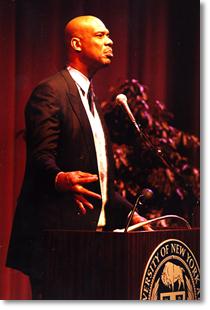 He also noted that people in the Western New York
area historically have been supportive of the rights of African
Americans, particularly through their efforts in the Underground
Railroad.
He also noted that people in the Western New York
area historically have been supportive of the rights of African
Americans, particularly through their efforts in the Underground
Railroad. 
By CHRISTINE VIDAL
Reporter Editor
Better knowledge of the accomplishments of African Americans throughout history "certainly would give a lot of black Americans something to say 'this is our country, too, and our ancestors have done something heroic,'" he said.
The NBA Hall of Famer and co-author of "Black Profiles in Courage," brought this message to UB last week when he presented the 21st annual Martin Luther King Jr. Commemoration Feb. 20 in the Center for the Arts' Mainstage.
The impetus for his book, Abdul-Jabbar said, began with a homework assignment of his son's, who was unable to find information on the accomplishments of African Americans.
"Black Americans have to go and fight for information that doesn't relate to slavery and the civil-rights movement. You wonder if black people have done anything (else)," he said.
Western European culture is the primary influence on the current understanding of history, and other cultures are treated as insignificant, according to Abdul-Jabbar. The result is stereotypes that "make it impossible to know what black Americans have had to suffer through," he said.
"Stereotyped ideas of people based on where their ancestors came from became part of the mythology," he said. "On the other hand, a lot of black Americans don't really understand what has happened in their past. A lot has been lost in history."
The problem is compounded by the impression many blacks share of white people as repressors, not realizing the contributions of many white people who have fought on their behalf.
"For me, personally, John F. Kennedy was a hero with regard to his personal courage" during the Cuban Missile Crisis and his support of civil rights, Abdul-Jabbar said.
 He also noted that people in the Western New York
area historically have been supportive of the rights of African
Americans, particularly through their efforts in the Underground
Railroad.
He also noted that people in the Western New York
area historically have been supportive of the rights of African
Americans, particularly through their efforts in the Underground
Railroad.
"Nothing in popular culture deals with the heroism and ingenuity of white people who made the Underground Railroad happen," he said.
Abdul-Jabbar traced lives of several African Americans who made important contributions to history, among them, Crispus Attucks, a seaman who befriended the patriots and died during the Boston Massacre, and Peter Salem, a slave whose freedom was purchased by the patriots and who fatally shot the commander of the British forces at Bunker Hill and helped to secure the first American victory of the Revolutionary War.
He ended his lecture with a story about one of his favorite characters, Bass Reeves, a long-time peace officer in the Oklahoma territory and a man of such integrity that he arrested his own son on a murder charge.
"If anything could test the quality of honor and integrity in a lawman, that case shows what Bass Reeves was all about," Abdul-Jabbar said. Responsible for more than 3,000 arrests during his career, which spanned more than 35 years, "Bass Reeves was a cut above...a premier lawman of the 19th century," he added.
During the question-and-answer period that followed his lecture, Abdul-Jabbar encouraged young people in the audience to learn, educate themselves and have a dream.
"Roadblocks are not part of the landscape. They can be overcome and they will be overcome," he said.
"It is an unfortunate fact of life in the black community that a lot of our kids are running the streets and are not made to understand the value of knowledge. The lack of knowledge is what holds any group of people back.
PHOTO BY DON HEUPEL